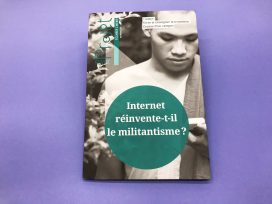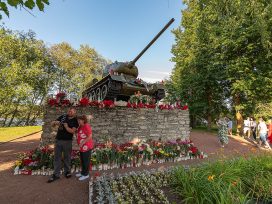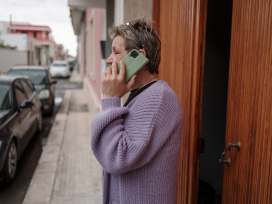Wojciech Przybylski: What can cross-border journalism achieve that cannot be achieved within a national media landscape? What is the role of the media in disputes over the contested past?
Arne Ruth: In 1997, when I was editor-in-chief of the biggest Swedish morning daily Dagens Nyheter, we decided to conduct an investigation into a matter that had attracted almost no public attention: the forced sterilization of some 60 000 Swedes, most of them poverty stricken women, between the 1930s and the mid-1970s. The forced sterilization project was a cross-party decision in the mid-1930s and was described as a “social measure”. Forced sterilization was an attempt to solve an emerging problem: women having too many children who were destined to be brought up in bad conditions. The scheme was also supported by the medical profession. There were a few voices against it raised in the Swedish parliament, but ultimately it was majority decision involving all parties. The policy ran until 1975. Afterwards, it was largely forgotten, left to the memory of those 60 000 persons who had been affected.
A Polish-born Swedish journalist, Maciej Zaremba, investigated the issue and published several articles in Dagens Nyheter. There was no reaction whatsoever for the first two days. No other newspaper commented, there was no political reaction. But then foreign correspondents suddenly realized that this was the story of the year and everything changed. Sweden was very much considered a bearer of morality, of justice, of equality and it was big news that it had actually had a scheme of this kind, so discriminatory that it is hard to imagine anything similar happening today. Not big news in Sweden, but abroad. Two days later, Stockholm was invaded by correspondents from all over the world, including Japan, New Zealand and Australia. Television anchormen from the US confronted Swedish politicians; at one such session, the Swedish minister for social affairs was asked on live television what he was going to do. How was he going to compensate the victims of the sterilization policies? No Swedish journalist, including Zaremba and myself, had raised that question. We needed a foreigner to ask that very simple, absolutely crucial question. Finally, the Swedish government had to start an investigation, which resulted in an official apology as well as financial compensation to the victims.
How would this matter have been treated if foreign media had not raised the issue? Probably it would have been sidelined forever. This shows very clearly that with these kinds of questions, cross-border action is absolutely necessary.
WP: This is of course not an exclusively Swedish problem.
AR: No, most countries have dark closets that have never been opened. Since no one has raised the issue, people have not even started to reflect upon it as a problem.
Another example is related to the discussion about the Holocaust. Norway has a history of a very solid resistance during the Second World War. The resistance movement was widespread and the Germans were never able to eradicate it completely – in contrast to Denmark, where the resistance started only in 1943 and was never anywhere near as effective as in Norway.
Quisling – a name that everywhere is synonymous with “traitor” – was a Norwegian who ruled Norway in a peculiar way under German supervision. He wanted to keep some areas under his own influence and those related to the Holocaust were very much part of this agenda. In 1840, Norway had introduced a well-concealed clause in the constitution that stated that Jews and Jesuits were not allowed to set foot in Norway. This paragraph remained until the 1850s, when it was abolished. One of Quisling’s first measures was to reinstate the paragraph, which meant that forcing Jews out of Norway became a Norwegian, not a German project. Already in Autumn of 1942, Jews were arrested and brought to concentration camps in Norway and then to Auschwitz, where 90 per cent of them died within two or three months.
The Jewish minority in Norway was small, only about 3000. In the discussions about what happened in Norway during the War, the Jews were rarely an issue. In 1995, at the fiftieth anniversary of the liberation of Norway, the media told the heroic story once more. But one Norwegian journalist decided to do the opposite. He started to investigate what happened to the Jews, finding evidence in Norwegian archives that showed that Jewish property had been sold at public auctions all over Norway – and ordinary Norwegians had bought it. The profits were put into the public domain and after the War the few Jews that survived had great problems getting compensation for this confiscated property. This had never been brought into the open.
When the story was published in the main Norwegian business daily – it was a six-part story, very solidly researched – there was no reaction whatsoever. But the Jewish Congress in New York heard about it and asked the journalist to write an English version, which appeared half a year later and was catapulted into the world by Reuters. All of a sudden it became an international news item, landing on the desks of Norwegian media and becoming a front-page story all over the country. The Norwegian government was so affronted by the international reaction that within three weeks it set up a special commission to deal with the matter. The international reaction had forced the issue. Otherwise, nothing would have happened.
In my opinion, the whole question of how countries deal with their past depends on this type of interaction across borders. Norway was finally forced to face the fact that its narrative of wartime resistance largely excluded its treatment of the Jews, and that this exclusion continued in very subtle ways. In France, where the complicity of the Vichy government had much wider ramifications, the contrast between an heroic nationalist narrative and the actual facts is even more striking. It took the effort of an American scholar, Robert Paxton, to force French historians to finally start dealing with these issues.
Cross-border interaction on moral issues like these is absolutely necessary. If you leave it to be dealt with only in the national realm, much will be left out. It is essentially a citizens’ issue. The state cannot be trusted to deal with matters like this. State powers uphold their own political mythologies, so it is essentially civil society that has to act across the borders. This is also true for issues such as the ones that affected Europe more recently. Radovan Karadzic could never have been brought to trial in The Hague without the efforts of civil groups in that region, and of journalists who took the matter seriously in terms of how it affected ordinary citizens, its human and social aspects. Journalism must be defined in a cross border perspective – to a much greater extent than is presently the case.
Danuta Glondys: This disillusion with the national idea and the image of national discourse created by foreign journalists does not really apply to the central European countries. I also don’t agree that it is primarily civil society’s responsibility to shape the moral stance and policy of a country.
History is not only a depository of data from the past, it also offers a critical interpretation of these events and legitimizes a group identity. That is why it is so important for Europe, a continent that is growing together. History gives us the memory of shared experience, cultural conduct and a system of ethics. That’s why, when we speak about testimonies, historical politics or memories, there is always a danger involved: the trap of historical memory, or what I call the revenge of memory. This trap can be observed in pub debates as well as academic ones, among politicians as well as journalists. We are caught in the trap of our own past, the trap of our identity – and to come out of there we have to work hard. Not only we Poles, but also the French, Spanish, Germans, Swedes and the rest.
The revenge of memory is present in all historical debates and it affects everyone. It has both an individual and a collective dimension. It stands both for the revaluation of the past and the desire for the proper recognition of our past. This is what we all demand; it is, for example, what representatives for the German Federation of Expellees such as Helga Hirsch and Erika Steinbach demand.
As far as individual memory goes, we can identify at least three types. First, there is the testimony of the oppressor, of those people who committed the crimes and those who abetted them – like the media in the Balkans in the 1990s or the Chinese media in 1989, who commented very nicely on the massacre on Tiananmen Square.
The second testimony is that of the oppressed. But have you noticed that victims very rarely speak about what happened in the past? The victims of Auschwitz, the victims of Hiroshima and Nagasaki, the victims of the Tiananmen massacre, they rarely speak. They keep silent and want to be silent. This is the dignity of the victim.
The third testimony is that of the observer. Of the “local and foreign audience”. Outsiders, media and academics that feel that it is their duty to speak as a witness, without necessarily being asked to do so by the victims themselves. The trap here is that this is a very attractive role: we can all play the role of observers and sympathize with the victim. Fighting for them puts us on the side of ethics; our demands for reconfirmation, for compensation become legitimate.
When we speak about collective memory, one should also differentiate between remembering and commemorating. There is a big difference. We commemorate to safeguard that the public memory will continue to exist. This may take the form of written history, of establishing a national image of defeat, or of victory, it depends on what we want to celebrate. Or it can be monuments, national parades, parliamentary resolutions – and associations that, in the name of the victims, demand moral and material compensation. Again, the trap is always present. The distinction between the oppressor and oppressed tends to get smaller and smaller – and even ceases to exist if the discourse is carried out in such an emotional and nonchalant way that it allows the international public to speak about Polish concentration camps, as was the case not long ago.
This is why writing history is not the task of non-governmental organizations and civil society. It is a political task. It’s an attitude-creating task for which the government is and should be responsible. Mark Twain once said “When I was younger, I could remember anything, whether it had happened or not; but my faculties are decaying now and soon I shall be so I cannot remember any but the things that never happened.” Memory can store anything we want. That is why the responsibility is in the hands of the historians in combination with a wise, careful and respectful government policy.
WP: Is this an especially sensitive issue here in central and eastern Europe?
DG: In the central European context, the revenge of history and memory is a fact. It takes different forms. First, you have the confrontation of opinions and political statements as in the case of the dialogue between Czechs, Poles and Germans over the issue of the expelled Germans. The second type of revenge of memory is centred around ourselves. We were the ones suffering, we were the victims. There are many myths and national narratives to get rid of. According to one of these myths, Poland was always an innocent victim. Never an aggressor. We never did anything wrong. We suffered. We were the martyrs of Europe. For 200 years we had to suffer so that Europe could be free and we could carry this messianic message of independence, freedom and sacrifice. This has changed, not only with the debate about the nationalist Polish government – which was on the initiative of international media. We have also come to understand that history is not that simple. And we are learning fast! I am proud of the way Polish-Ukrainian relations have developed, that we have been so quick to reach this stage not only of cohabitation but of cooperation. The basis for this is forgetting rather than remembering – and thinking about the future. The revenge of memory is not only that we have to rewrite our history books, but also that we have to respect that other people rewrite their history books too.
1989 was a key moment in this regard. The political independence that we gained was also gained by our neighbours and other countries in eastern Europe. With this dramatic change we could substitute the ethos of survival with the logic of equity and fairness, with the logic of dialogue. We started to ask questions about whether we perhaps did something wrong in the past. As for the Polish-Ukrainian relations, the first contact was established by intellectuals, then there was some parliamentary involvement, the presidents met, and finally the borders were opened. When Ukrainians started to come to Poland and Poles went to Ukraine, we suddenly realized that the stereotypes present in both societies were false.
Most Europeans live in territories where there have been wars, victims, oppressors; there were people who were killed and those who survived. We will not solve all the problems from the past. The new history lesson that we have to learn is that the most important thing in life is life itself, and not who is right.
WP: The two of you seem to advocate different strategies for dealing with a difficult past. On one hand, the importance of transnational dialogue to bring forward contested issues and foster a discussion that will advance integration and reconciliation. On the other, the fear that history always divides but never unites.
AR: Well, it seems to me that the development of a new relationship between Poland and Ukraine illustrates my thesis. It started with the intellectuals, it started in civil society. These kinds of changes rarely start with government action, they start with a discussion that eventually puts pressure on governmental bodies.
One of the authors who changed my perspective on how to discuss the Holocaust is Hanna Krall. She dealt with the individual aspect of the Holocaust. She writes about the absence of Jews in Poland, the void that was the result of the Holocaust. Among ordinary historians, the individual aspect of the Holocaust was for a long time considered to be irrelevant. That has changed, for example with British historian Christopher Browning’s book Ordinary Men, which is about soldiers who learn to commit genocide as part of regular military action. He dealt with the butchers on an individual level.
There has to be a dialectic between the individual perspective and the general political interpretation of history, and this also includes a cross-border discussion. Of course there are other issues where cross-border discussion may be fraught with problems. The question of compensation to German expellees – the issue of who owns what in relation to territorial changes as a result of the War – is such an issue. I sympathize with Poland in that matter. Germany started the War and has to bear the consequences. But of course this question will not be settled in an easy manner.
To me this is not just a matter of Europe. I am very engaged in what is happening now in Iran because my wife is an Iranian dissident. We get continuous information about the ongoing political revolt. It is not only political refugees who are justified taking a stand. Just as I took a stand in the Vietnam conflict, both on the national level and the international level, so I claim the right to take a stand on what is happening in Iran, for instance by confronting my own government on how it acts in this matter. These are all issues that are legitimate cross-border matters. My point is really that it is the right of anyone to say, “that is my position and I won’t accept a human rights situation that I wouldn’t accept in relation to myself”. Regardless of what country one is talking about.
Such moral convictions have an influence on what journalists do. What matters are important? What should be reported? What should we discuss? Only a mixture of interpretations across borders can help define these issues. It cannot be kept within national borders.
DG: I agree. My own worry, however, is that we rely too much on common European solutions concerning the former peace treaties. The attempt by Vaclav Klaus, the president of the Czech Republic, to make the suspension of the Charter of Basic Rights a condition of signing the Lisbon Treaty, was a bit late. But still, a lot of people in the Czech Republic are worried about the property taken from the Germans and given to the Czechs. As far as the call for compensation to Polish citizens goes, this won’t change anything. But it’s an important issue for the political Right and for an increasing number of people. This is certainly not good news for the European Union.
WP: You both referred to the role of the media in the conflicts on the Balkans. Was it not the case that the transnational exchange on historical ethnic and religious clashes contributed to the crisis? That the politics of memory acted out in the media escalated the conflict rather than contributing to reconciliation? The media is not always on the side of mutual understanding.
AR: I don’t think you can blame the conflict on the way outside media dealt with it. But, of course, history – often represented and misrepresented by the media – played an important role in the conflict. If you know anything about Yugoslavia you also know that it has a very tragic past related to the Second World War. As soon as the history of the killings – not only by Germans but by the Croatian Ustasha and others – was brought into the open, it became political dynamite and was instrumentalized for different purposes.
Once the conflict had already started, the question was how the media should deal with atrocities like Srebrenica or the siege of Sarajevo. Should they deal with it at the political level and in general terms, or should they make investigatory reports about what was really happening? You find a number of journalists who, at great personal risk, actually did the latter. I was not heroic in any way, but I visited Sarajevo during the blockade and could see with my own eyes how the European community allowed a population to be completely isolated from the outside world for two months. That was a moral failure, in my opinion. There was no real compassion or understanding of the situation – except for some journalists willing to take great risks and deal with the conflict at a basic level. They described what happened to individuals, who was killed and by whom. Without that, I don’t think that we would have the International Criminal Tribunal for the former Yugoslavia working the way it does, in a reasonably fair manner.
But of course, journalism is no more ethical than any other professions.
Carl Henrik Fredriksson: Danuta Glondys, you seem to be suggesting that in order to find a way to co-exist peacefully it is sometimes necessary to forget the atrocities of the past. You refer to the harsh Polish-German conflict around the forced migration of ethnic Germans after the Second World War, and in contrast ascribe the improvement of the Polish-Ukrainian relationship mainly to an ability to forget rather than to remember. How do you see this interplay between forgetting and remembering?
DG: To forget is to try not to remember what you already know. You have to know first in order to forget. We have to forget. I don’t want to remember all the atrocities of the war between Poland and Sweden. I want to forgive. To forgive the Swedes for stealing our crown jewels, which I recently saw when I visited Stockholm. If I were to ask Arne Ruth for restitution, we would not be sitting together at this table today.
My personal story is also very complicated. Auschwitz was a place where my father could find a job. I spent fifteen years there as a child, so I know what there is to forget. I have to forget about it. It’s too much pain. I would have to hate so many people. I remember the victims, and that’s why I want to forget those who killed them.
WP: But do you really have to forget in order to forgive?
DG: I’m not telling you not to remember. I was talking about me. I simply cannot cope with this memory.
AR: I can agree with you to some extent, there are some sensitive aspects of history that can be forgotten without serious consequences. Denmark and Sweden were for a long time two small states with imperial problems and they fought with each other for hundreds of years until the mid-nineteenth century. Then things started to change, and essentially forgetfulness is a big part of that. Most people in Europe don’t know that the west coast of Sweden was Danish until the mid-seventeenth century. This fact is no matter of concern anymore. This is a complete contrast to Serb nationalists, who used things that happened to Serbs in the fourteenth century as legitimization for their military projects in the 1990s. That kind of remembrance is very destructive.
Even though there are now tensions between Germany and Poland, one shouldn’t forget that there were serious efforts in finding a common definition of crucial aspects of history. The Catholic Church played an important role in this even during the communist era.
However, some parts of history have a moral aspect that simply makes it impossible to forget. Obviously, the Holocaust is such an issue – the fact that people who lived and worked as part of their community for a long time all of a sudden found that they weren’t allowed to continue living; not only there, but to live at all. On the ground level this was a typical inter-state war, but for the Germans it was essentially defined as a project of ethnic elimination. In my opinion, this is the crucial difference between the Second World War and all previous wars. There is a moral distinction between matters that can be forgotten and those that cannot.
Europe has to deal – in a cross-border manner – with this and with the fact that anti-Semitism was present both before and after the War. I have close friends in Stockholm who came here in 1968 because the communist government was forcing Jewish Poles out of the country. No matter relating to anti-Semitism as an ideology can be defined in solely national terms.






